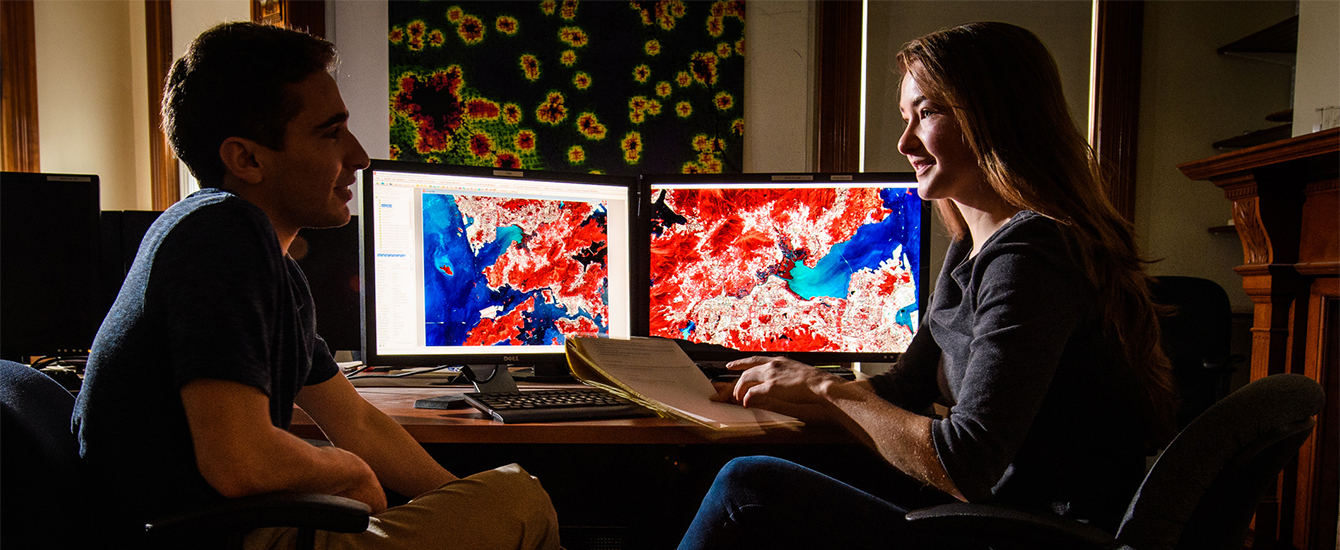Clark Center for Geospatial Analytics
 Based alongside the world-renowned Graduate School of Geography at Clark University, the Clark Center for Geospatial Analytics (CGA) is dedicated to the research and development of geospatial technologies to advance environmental management, climate resilience, sustainable development, and equitable decision-making. Building upon the legacy of Clark Labs, which has now merged with the CGA, the Center continues its tradition of pioneering innovation in geospatial science and technology.
Based alongside the world-renowned Graduate School of Geography at Clark University, the Clark Center for Geospatial Analytics (CGA) is dedicated to the research and development of geospatial technologies to advance environmental management, climate resilience, sustainable development, and equitable decision-making. Building upon the legacy of Clark Labs, which has now merged with the CGA, the Center continues its tradition of pioneering innovation in geospatial science and technology.
Partnering with such organizations as NASA, IBM, Conservation International, Verra, TerraCarbon, and the United Nations, Clark CGA leverages its academic base to develop cutting-edge research tools, provide software solutions to organizations in need, and apply geospatial expertise to a range of real-world problems. CGA maintains a strong commitment to open-access software, open science principles, and cloud-native geospatial innovation.
Clark CGA plays a key role in the continued development of the TerrSet Geospatial Monitoring and Modeling System. In 2024, it launched TerrSet liberaGIS, a new generation of free geospatial software that includes updated versions of key modeling tools such as the Land Change Modeler, and Earth Trends Modeler.
The Center’s research and development efforts are driven by an emphasis on scientific rigor, transparency, and the creation of impactful, real-world solutions. Areas of significant research and development include:
- Climate and Ecosystem Dynamics
- Geospatial Artificial Intelligence (GeoAI)
- Land Change Modeling and Conservation Planning
- REDD+ and Sustainable Forest Management
- Uncertainty and Risk Modeling
- Spatial and Temporal Process Modeling
- Open-Access Geospatial Software and Tools Development
Join the newsletter to receive updates from Clark CGA and to stay in touch.
George Perkins Marsh Institute
 Grounded in nearly a century of applied research at Clark University, the George Perkins Marsh Institute advances scientific understanding of the ways in which humans influence–and are influenced by–our surrounding natural, technological and socioeconomic environments. Working within a collaborative agenda, the Institute coordinates resources from Clark University and elsewhere to study human transformation of the environment and responses to this change. Among the hallmarks of the Institute are collaborative research efforts that challenge traditional disciplinary boundaries in search of novel approaches and solutions, along with systems-based perspectives to wicked challenges such as climate change and human development. The Institute is home to more than 50 research faculty and staff, many of whom have joint appointments with other departments
Grounded in nearly a century of applied research at Clark University, the George Perkins Marsh Institute advances scientific understanding of the ways in which humans influence–and are influenced by–our surrounding natural, technological and socioeconomic environments. Working within a collaborative agenda, the Institute coordinates resources from Clark University and elsewhere to study human transformation of the environment and responses to this change. Among the hallmarks of the Institute are collaborative research efforts that challenge traditional disciplinary boundaries in search of novel approaches and solutions, along with systems-based perspectives to wicked challenges such as climate change and human development. The Institute is home to more than 50 research faculty and staff, many of whom have joint appointments with other departments
It is home to the Jeanne X. Kasperson Research Library specializing in publications on environmental risks and hazards and more.

